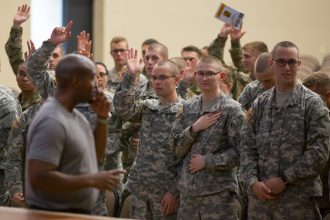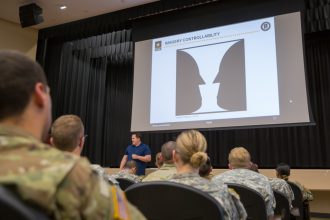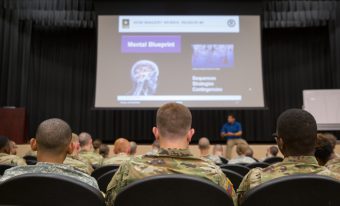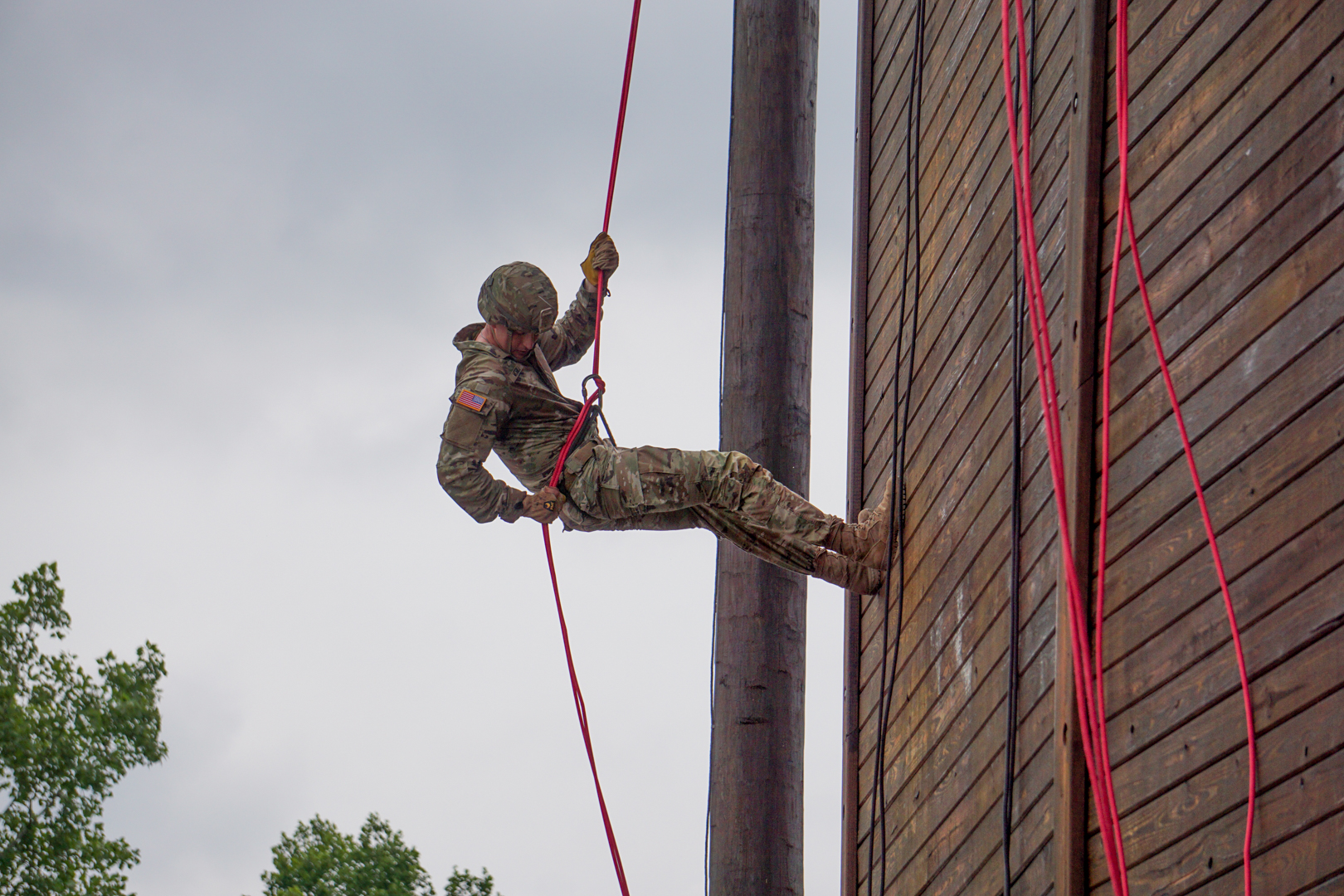FORT KNOX, Ky. — Basic Camp Cadets begin their first steps in their training in the classroom to gain helpful tips in overcoming the ahead.
Jon Walker is the Lead Performance Expert at Fort Knox and one of the leaders from the R2, Ready and Resilient, Performance Center running the 1st Regiment Basic Camp Cadets’ Performance Training.
Described by Walker as, “PT for the mind,” this training focuses on five mental toughening skills to help the Cadets prepare for their month here at basic camp.
Confidence, concentration, composure, goal setting/motivation and integrated imagery are all things the Cadets are taught and then shown how to put into practice throughout the day.

Cadets from 1st Regiment Basic Camp practice tactical breathing with Master Resilience Trainer Performance Expert Jon Walker, at Olive Theater, June 24, 2019. | Photo by Kyle Crawford, CST Public Affairs Office
“What I have seen in my years of being associated with CST [Cadet Summer Training] is that routinely they [Cadets] take away the deliberate breathing,” Walker said. “Deliberate breathing is an easily employable skill… Whether it’s trying to wake up, keep a firm sight picture, navigate through the confidence course or the ropes course, or even right before going into the CBRN chamber.”
An entire day in a classroom may not sound like the most exciting thing, but the Cadets knew that going forward these tips could be just what they need to tip the scales in their favor.
For Cadet Palmer Russell from Memphis, Tennessee, the mental strengthening was crucial moving forward.
“The mental rehearsal is something I really picked up and thought would be important,” Russell said. “From remembering my past experiences with doing successful things, I may not have realized it but they had been a part of what I did subconsciously to prepare for success.”
Mental imagery leads to mental fortitude, and that’s exactly what this University of Memphis Cadet is banking on for the trials ahead.
“I think it’s important to teach us ways to be strong and keep our mindsets positive throughout training because the point of the training is to stress us out, break us down and build us back up,” Russell said. “So, we have to get to that point where they can rebuild us without completely breaking us down.”

Cadets from 1st Regiment Basic Camp participate in an exercise to learn about imagery controllability during performance training, at Olive Theater, June 24, 2019. | Photo by Kyle Crawford, CST Public Affairs Office
Cadet Conor Burns, from the University of Minnesota Twin Cities, noted on the practical and far-reaching aspects of this training.
“I think developing confidence,” the Washington D.C., native said. “Just understanding how your own mind works with certain things and getting a better idea of what you can do to better prepare yourself to accomplish different tasks. There’s a lot you can develop there which will be instrumental to anything you do later in your life.”
Finding the importance in what most would consider mundane allows Burns to stay interested and confident moving forward.
“I realize everything they’re teaching us is really important, so I just came at it with an open mind,” Burns said.
Keeping an open mind was a common sentiment among the Cadets. Cadet Brian Powell, a Holliston, Massachusetts native, echoed this and built upon it.

Cadets from 1st Regiment Basic Camp listen to a lecture on using imagery by Master Resilience Trainer Performance Expert Gino Barbagelata during performance training, at Olive Theater, June 24, 2019. | Photo by Kyle Crawford, CST Public Affairs Office
“Keep an open mind,” the Providence College Cadet said. “Even when you are down in the dumps and you feel like everything is going bad. Remembering that it’s all better for you so that you can become a better leader and a better Cadet.”
Becoming a better leader and Cadet is what Jon Walker’s staff hopes to see throughout their training. The R2 performance staff will check in with Cadets at the confidence course, high ropes, CBRN, and when the Cadets group and zero their rifles to make sure that the training has held and the Cadets have benefitted from the tips they have learned today.




